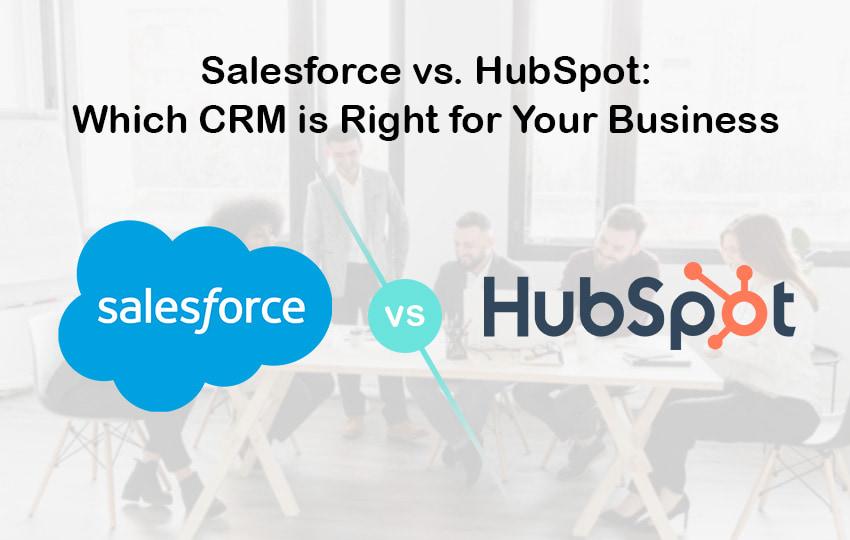CRM systems have become game-changers, revolutionizing the way businesses create marketing plans.
When it comes to CRMs, Salesforce and HubSpot are the big players in the field. Each has its own unique strengths and advantages. But which one is better for your business?
We will break down their features, benefits, and applications to help you make an informed choice.
Understanding the CRM Landscape
CRM has become a prerequisite to running a successful business, especially in today’s world. It helps you streamline your operations, keep customers happy, and drive growth.
What is CRM and Why is it Important?
CRM stands for Customer Relationship Management. It helps you manage and analyze all your interactions with customers. By using a CRM system, you can keep track of customer details, communication history, and preferences all in one place. It’s a game-changer for improving customer relationships, boosting sales, and delivering top-notch service.
Benefits of a CRM System
Here are some benefits of implementing a CRM system:
- CRM offers centralized customer data. It means no more searching through different systems or spreadsheets for customer information. Everything is in one easy-to-access location.
- CRM tools provide features that make your sales team more productive and efficient. You can track leads, manage your pipeline, and automate tasks, making it easier to close deals.
- It helps you stay on top of customer support by tracking interactions, resolving issues, and managing service requests. Your customers will feel heard and appreciated.
- With powerful reporting and analytics capabilities, CRM systems give you valuable insights into your sales performance, customer behaviour, and market trends. It’s like having a crystal ball for making smarter business decisions.
A Brief Overview of Salesforce and HubSpot
The CRM market has been booming lately, thereby popularizing Salesforce and HubSpot. Let’s take a closer look at what makes them special.
Salesforce
Salesforce is like the king of CRM solutions, especially for big companies. It’s been around for a while and has earned its reputation as a powerhouse in the world of enterprise CRM. It’s super flexible, customizable, and packed with features that can handle even the most complex business needs.
HubSpot
HubSpot is like a friendly neighbourhood CRM service provider. It’s designed for small to mid-sized businesses, with a focus on inbound marketing strategies. HubSpot combines marketing, sales, and service tools all in one place, making it easy to attract, engage, and delight your customers.
Let’s get into the detail about each of them.
Salesforce: The Powerhouse of Enterprise CRM
Salesforce CRM development has established itself as a powerful tool. This cloud-based platform offers a comprehensive set of tools and features to help businesses manage their customer relationships like a pro.
One of the things that sets Salesforce apart is its scalability. Whether you have a small team or a massive organization, Salesforce can handle it all. You can start small and expand as your business grows, without worrying about hitting any limits.
Salesforce offers a vast array of features, but let’s highlight a few of the big ones:
- Salesforce CRM system customization is quite. From custom fields and workflows to building your own apps, it gives you the flexibility to make it truly your own.
- When it comes to Salesforce integration services, it performs everything from syncing data with your marketing tools to integrating it with your customer support software. That’s why most companies in finance, healthcare, and manufacturing choose this very tool.
- Salesforce CRM Solution allows you to automate your marketing campaigns, nurture leads, and track marketing ROI with Salesforce’s powerful marketing automation capabilities.
- Salesforce’s reporting and analytics tools help you gain insights into your sales performance, customer behaviour, and overall business health.
HubSpot: The All-in-One Inbound Marketing CRM
HubSpot also works the same way as Salesforce CRM, with a special focus on inbound marketing strategies. If you’re all about attracting customers with killer content and building strong relationships, HubSpot might just be the CRM for you.
HubSpot CRM follows the inbound marketing philosophy, which is all about attracting customers by offering valuable content and creating meaningful connections. Instead of bombarding people with ads, HubSpot helps you to create useful content that pulls customers in and keeps them engaged throughout their buyer’s journey.
Here are some of the most prominent features of HubSpot CRM:
- HubSpot’s user-friendly platform lets you create landing pages, forms, and pop-ups that make it easy to collect visitor information. Plus, they’ve got nifty tools for scoring and organizing leads, so you can focus on the ones that are most likely to convert into customers.
- HubSpot allows you to create, update, and optimize your website content without breaking a sweat. And here’s the best part: HubSpot integrates smoothly with blogging, social media, and email marketing tools, so you can easily share targeted content with your audience. They even have marketing automation features that take care of repetitive tasks like email workflows and lead nurturing. Time-saving and effective!
- HubSpot’s CRM platform also has handy features for managing your sales process. You can track deals, keep tabs on your contacts, and see the history of your communications—all in one place.
- When it comes to customer service, HubSpot offers a ticketing system, live chat, and knowledge base features, so you can provide top-notch support.
- Just like Salesforce solution, as your business grows, HubSpot grows with you. It gives you the flexibility to create a CRM environment that works for you.
Key Factors in CRM Selection
When it comes to picking the right CRM system for your business, there are a few important things to consider:
Budget
Take a good look at your budget. Salesforce is known for its fancy features, but it can be a bit pricey, especially for smaller businesses. On the other hand, HubSpot offers more budget-friendly pricing plans, making it a solid option if you’re watching those pennies. It is, however, important to compare plans from both CRMs and what they include.
Scalability
As mentioned, Salesforce is the go-to for larger enterprises with complex sales processes. It’s super scalable and customizable to fit your needs. HubSpot, on the other hand, is great for small to mid-sized businesses that love inbound marketing strategies.
Customization Options
How much tinkering do you want to do with your CRM system? Salesforce is like a DIY paradise, with endless customization options. You can really make it your own. HubSpot is a bit less customizable, but it makes up for it with a user-friendly interface and pre-built templates designed for inbound marketing wizards.
Integration Capabilities
Salesforce has a huge list of integrations and a bustling marketplace for third-party apps. It can sync up with just about anything. HubSpot also offers integrations, but it’s more focused on being an all-in-one solution for marketing, sales, and service.
User-Friendliness
Salesforce can be a bit of a learning curve with all its bells and whistles. It may require some training and expertise. HubSpot, on the other hand, is designed to be user-friendly and intuitive. So, if you want something that your team can pick up quickly, HubSpot is a good bet.
Industry-Specific Requirements
Does your business have any special industry needs? Salesforce has been trusted by a wide range of industries. HubSpot, on the other hand, shines in industries that love inbound marketing, like e-commerce, digital agencies, and SaaS companies.
Future Growth Potential
Salesforce is known for its robust capabilities and scalability, making it a great choice if you’re aiming for big-time growth. HubSpot may not have as many features, but it offers a comprehensive suite of tools for inbound marketing. That means you can nurture leads and drive growth through targeted marketing campaigns.
Take your time to consider these factors and think about what matters most to your business. Remember, there’s no one-size-fits-all solution. So, weigh your budget, scalability needs, customization desires, integration preferences, user-friendliness, industry quirks, and long-term goals.
Making the Right Choice
Take a good look at your business and figure out what you really need from a CRM system. Consider your company size, industry requirements, and the challenges you face. Here is a checklist to get you started:
Do Your Homework
Check out the websites of Salesforce and HubSpot, read customer reviews, and dig into comparison articles. Get a good sense of what each CRM platform has to offer.
Try Before You Buy
Don’t be shy about requesting demos or free trials. Test both Salesforce and HubSpot to see which one feels more comfortable and intuitive, especially the features that matter most to your business.
Get Feedback from the Team
Your employees are the ones who will be using the CRM system day in and day out. Involve them in the decision-making process. Ask your sales team, marketing folks, and customer service reps for their input. Their perspectives and insights are invaluable.
Final Thoughts
Salesforce and HubSpot are both solid CRM platforms, each with its own strengths. By knowing your business, doing your research, trying out demos, getting feedback from your team, considering the costs and ROI, and thinking about the future, you’ll be on your way to finding the perfect fit.








